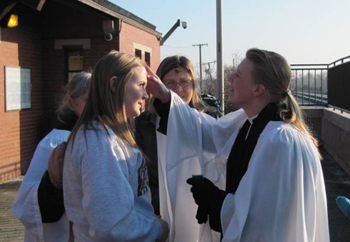“Beware of practicing your piety before others in order to be seen by them” (Matthew 6:1 NRSV). These words from Jesus always open the Gospel reading in the Episcopal Church on Ash Wednesday.
It is a strange text, considering that this is the day we put ashes on our foreheads and go out into the world -- to work, to school, to our regular lives. Ash Wednesday is the contradictory beginning to the contradictory season that says that we find life by going through death, light by going through darkness, joy by going through suffering. It is the beginning of Lent, the preparatory season before Easter and the holiest time of the year.
And if a blackened sign of the cross isn’t already an all-too-public expression of piety, some Christians have been ratcheting up the display even more in recent years. Increasingly, Episcopalians and people from other denominations have been participating in Ash Wednesday services on street corners and sidewalks and in other public spaces.
Some call this “ashes to go.” But after leading such services the past few years, I chafe at the phrase. It’s a little gimmicky, a little too fun for the solemnity of the occasion. Still, even though I dislike the nickname, I will publicly offer ashes again this year, somewhere in the Diocese of North Carolina, on the very day when Jesus warns us not to do such things.
Ironically, paradoxically, Jesus’ warning is exactly why I am compelled to participate. Ash Wednesday is a day when we consider our mortality: “Remember you are dust, and to dust you shall return,” we say as we impose ashes on the foreheads of penitents.
Obviously, it is also a day when we remember very clearly that we are sinners -- not abstractly or in general but concretely, here and now. We hear the Gospel, then we act exactly the way that Jesus warns us against.
This is so powerful. And so true, at least for me. I do not act the way Jesus wants me to, not by a long shot, and on Ash Wednesday I cannot even pretend that I do. I fall short of what the Gospel asks of me. I need to be forgiven, to be saved.
Offering ashes in public on Ash Wednesday makes my brokenness even clearer. Doing this the past few years has taught me about both my own sinfulness and the world’s need for the connection and redemption that comes through Jesus Christ.
Last year, I participated with other priests in two public Ash Wednesday liturgies, first at a train station and then at a bus station. It rained most of the day, and it was very cold. Mostly what happened was nothing; people passed by with only the occasional curious look. To most of the world, this was just another Wednesday afternoon.
But as we stood silently and prayed, some notable exceptions occurred. One man was incensed by our presence, and he told us so quite clearly, calling us hypocrites and worse until security officers made him move along.
We were shocked -- but he had a point. Who were we to offer this strange ceremony to people on their way home from work? Before he left, the man opened his Bible and challenged us to show him where it said anything about Ash Wednesday.
He was right, of course. Jesus said nothing about ashes or a season of preparation. But as we both knew, he did say something about practicing our piety in public.
Much gentler exchanges also happened. Some people wanted to share what they knew about Jesus. A few were unfamiliar with Ash Wednesday but politely listened and even participated in the litany of penance and the recitation of Psalm 51.
Mostly, the people who stopped were eager to have someone to talk with about their faith. Even as I was practicing my piety openly, I began to wonder: How often I am willing to talk openly with others about what I believe? How often do my fears of offending others or of being vulnerable keep me from being the Christian I am called to be? Clearly, the world is hungry for the sharing that seems to happen only behind closed church doors.
So I will wear my own ashes and give ashes to others as a sign of all the ways we are not who we want to be, not living as we profess to believe, not pushing through the darkness in order to find the light. This mark of penitence tells the world that we know we have failed to bear the weight of the Gospel and that we are exposed to the judgment of God and of others.
We will not justify ourselves, and we will not hide. Instead, on this day, we stand out in the open and accept and even embrace our sinfulness and our failings.
And that, oddly, is good news. Ash Wednesday is only the beginning. In these next 40 days, we will find out what it feels like to put down all our pretenses: the ways we try to act like we are OK and that we can be good people by ourselves; the ways we justify our actions; the ways we blame others; the ways we try to prove we are worthy of being loved, worthy of all the gifts that we receive in this life.
Because the truth is that we are not. We never could be good enough to deserve the life we have been given. Ash Wednesday and Lent invite us to drop it all and find out for ourselves what it feels like to be loved and saved even though we don’t deserve it. Grace is a gift, and on Ash Wednesday it is one we get to experience when we practice our piety in public.
So next Wednesday, on a street corner or at a bus stop or a grocery store somewhere in North Carolina, I will stand in my vestments and offer ashes. I cannot imagine doing anything else.
Because the world needs it. Because I need it. Because this is the day we practice our piety in public.









